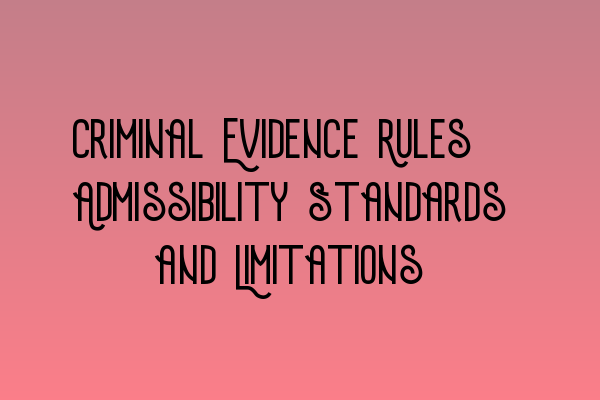Criminal Evidence Rules: Admissibility Standards and Limitations
Welcome to the SQE Criminal Law & Practice Law UK blog! In today’s post, we will be discussing the important topic of Criminal Evidence Rules, specifically focusing on admissibility standards and limitations.
Understanding the Importance of Admissibility in Criminal Trials
In a criminal trial, the admissibility of evidence plays a crucial role in determining the outcome of the case. The rules surrounding this issue are designed to ensure a fair and just trial while balancing the rights of both the accused and the prosecution.
Admissible evidence is information or materials that a court allows to be presented during trial proceedings. It can include witness testimony, physical items, documents, electronic data, and more. However, not all evidence is automatically admissible, as there are specific standards and limitations that apply.
Admissibility Standards
For evidence to be deemed admissible, it must meet certain standards set by the court. These standards include:
- Relevance: The evidence must be relevant to the case and have a tendency to prove or disprove a fact that is of consequence to the determination of the case.
- Reliability: The evidence should be reliable and trustworthy. This can be determined by considering factors such as the source of the evidence, its authenticity, and the methods used to obtain it.
- Probative Value: The evidence must have probative value, meaning it must actually prove or disprove a fact that is relevant to the case.
These standards ensure that only evidence that is directly related to the issues being decided is presented in court, preventing irrelevant or potentially prejudicial information from influencing the case.
Limitations on Admissibility
While the standards for admissibility guide the admissibility of evidence, certain limitations also exist. These limitations include:
- Hearsay: Hearsay evidence, which is an out-of-court statement offered for the truth of the matter it asserts, is typically excluded unless an exception applies. The court wants first-hand evidence, not second-hand information that may be unreliable.
- Opinion: Opinion evidence is generally not admissible unless given by an expert witness with specialized knowledge, or in certain circumstances where the opinion is based on personal perception.
- Illegally Obtained Evidence: Evidence obtained illegally, such as through a violation of a person’s rights or improper police conduct, may be excluded from trial to discourage unlawful practices.
These limitations help maintain the integrity of the legal system and protect individuals from unfair treatment or violations of their rights.
For a more comprehensive understanding of admissibility standards and limitations, it’s important to enroll in reputable SQE 1 and SQE 2 preparation courses. These courses provide in-depth knowledge and practical experience to prepare aspiring solicitors for the SRA SQE exams. To enhance your preparation for the SQE 1 exam, you can also access SQE 1 practice exam questions and SQE 1 practice mocks, such as FLK1 and FLK2.
Visit our related articles for more information:
- SQE 1 Practice Exam Questions
- SQE 1 Practice Mocks FLK1 FLK2
- SQE 2 Preparation Courses
- SQE 1 Preparation Courses
- SRA SQE Exam Dates
Thank you for reading our blog post on Criminal Evidence Rules: Admissibility Standards and Limitations. We hope this information has provided valuable insights into this pivotal aspect of criminal law. Stay tuned for more informative articles from SQE Criminal Law & Practice Law UK!
